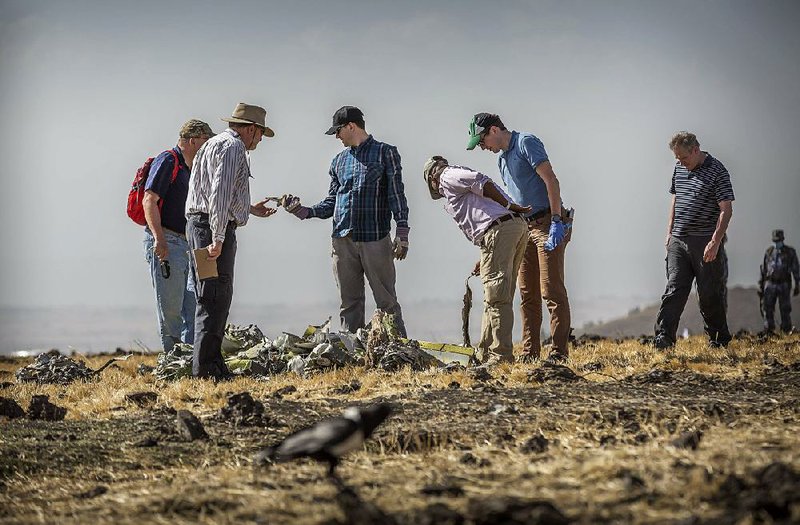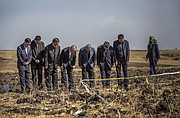The European Union Aviation Safety Agency has grounded the model of Boeing jet involved in two crashes that have killed more than 300 people.
The move follows action earlier Tuesday by the United Kingdom, France, Germany and at least 10 other countries to break with the Federal Aviation Administration and ground the U.S.-made Boeing 737 Max 8 aircraft, which was involved in a crash Sunday that killed 157 people in Ethiopia.
In a safety directive issued Tuesday, Britain's Civil Aviation Authority barred all Boeing 737 Max aircraft from flying in the country's airspace "in the interests of safety of operation and to protect the public."
Ethiopian and U.S. investigators are seeking insights into the disaster from a recovered digital flight data recorder and cockpit voice recorder, and it is unclear how long that process will take.
On Monday, Europe stood with the U.S. in saying it was too soon to make a decision on whether to temporarily ground the aircraft, Boeing's newest version of the 737, the Max 8, after it was involved in its second fatal crash in less than six months.
But Tuesday, following the lead of China and carriers in South Korea and Latin America, several European nations said they would take the same step.
Later Tuesday, Oman and the United Arab Emirates announced that they were barring flights by Boeing 737 Max aircraft, closing down two key markets for the airplane on the Arabian Peninsula. The UAE also announced its General Civil Aviation Authority would join the ongoing investigation into the crash.
The FAA had no comment on the growing number of groundings and issued no new statements Tuesday. On Monday, the agency reiterated its support of the jetliner, saying the model of aircraft was safe to fly. However, officials left open the possibility that it could take additional action if it receives information indicating that there is a safety risk.
Despite the growing concerns about the plane's safety, Boeing expressed confidence in its product, saying it has no reason to pull the popular aircraft from the skies. It does not intend to issue new recommendations about the aircraft to customers. Boeing's CEO Dennis Muilenburg also spoke with President Donald Trump and reiterated that the 737 Max 8 is safe, the company said.
"Safety is Boeing's number one priority, and we have full confidence in the safety of the 737 MAX," Boeing said in a statement.
Meanwhile, on the ground in Ethiopia, the crash investigation continued.
The National Transportation Safety Board, the U.S.'s top transportation safety oversight body, which along with FAA has sent investigators to the crash site, referred all questions on the status of the investigation to Ethiopian authorities.
Like the FAA, Britain's Civil Aviation Authority noted that "external reports are drawing similarities between this accident and Lion Air flight 610 on 29 October 2018 involving the same type of aircraft" in Indonesia.
According to the investigation into that crash, pilots wrestled with the plane because a faulty sensor and automatic feature sent its nose pointing down while the pilots struggled to direct the plane up. They requested permission to return to the airport shortly before plunging into the Java Sea.
Ethiopian Airlines Flight 302 crashed just six minutes after takeoff Sunday. During the brief flight, data showed that the plane ascended, then descended, then ascended sharply again while accelerating to speeds in excess of what is standard during a takeoff, officials have said. The pilot asked to return to Addis Ababa because he was experiencing difficulties.
But unlike top U.S. aviation safety officials, Britain's Civil Aviation Authority said the absence of information about what caused the Ethiopian Airlines plane to crash requires immediate action.
"Given the similarity of the two accidents, it has been decided that as a precautionary measure that all" 737 Max flights "should stop until appropriate safeguards are in place. This is needed to assure [Britain's Civil Aviation Authority] that the aircraft involved are fully compliant with internationally recognized standards."
The FAA, in a Continued Airworthiness Notification to the International Community issued Monday after Chinese authorities and others grounded the Boeing jets, noted that external reports were "drawing similarities" with the Indonesia crash.
But, the FAA said, "this investigation has just begun and to date we have not been provided data to draw any conclusions or take any actions."
U.S. Transportation Secretary Elaine Chao said "immediate and appropriate action" would be taken if a safety issue is identified.
Trump tweeted messages Tuesday morning lamenting what he described as the technological complexities of commercial aircraft.
"Airplanes are becoming far too complex to fly," Trump tweeted. "Pilots are no longer needed, but rather computer scientists from MIT."
"Split second decisions are needed, and the complexity creates danger," the president tweeted. "All of this for great cost yet very little gain. I don't know about you, but I don't want Albert Einstein to be my pilot. I want great flying professionals that are allowed to easily and quickly take control of a plane!"
Ethiopian Airlines, widely seen as Africa's best-managed airline, grounded its remaining four 737 Max 8s until further notice. The carrier had been using five of the planes and was awaiting delivery of 25 more.
Turkish Airlines, Oman Air, Norwegian Air Shuttle and South Korean airline Eastar Jet were among the latest carriers to halt use of the Boeing model. Ireland, the Netherlands, Malaysia, Australia and Singapore suspended all flights into or out of their cities.
A Turkish Airlines official said two Britain-bound planes returned to Istanbul after British airspace was closed to the aircraft. The official spoke on condition of anonymity because he was not authorized to speak publicly.
But in Norway, the head of that country's aviation agency said there was not yet enough information about the two crashes to warrant any new changes to training or ground the aircraft. Norwegian Airlines, however, which uses the Boeings in its fleet, announced that it was grounding the planes for the time being.
"When two new airplanes are involved in serious accidents shortly after being placed into service, questions are naturally raised," Lars Kobberstad, general director of the Norwegian Civil Aviation Authority, said in a written response to questions before the British regulators announced their ban.
"It is too soon to draw any conclusions as to probable causes or remedial actions," Kobberstad said. "The [Civil Aviation Authority] Norway is therefore not considering any remedial actions as of now."
He said the authority was "closely monitoring" Norwegian Airlines' compliance with a safety bulletin issued by Boeing and the FAA after the Lion Air crash last year.
U.S. CALLS FOR GROUNDING
Meanwhile, there was growing pressure on the FAA from a bipartisan group of U.S. lawmakers to ground the jets.
Sen. Dianne Feinstein, D-Calif., who was the first to call on the FAA to ground the planes, was joined by Sens. Richard Blumenthal, D-Conn.; Mitt Romney, R-Utah; Ted Cruz, R-Texas; and Elizabeth Warren, D-Mass.
"Until the cause of the crash is known and it's clear that similar risks aren't present in the domestic fleet, I believe all Boeing 737 Max 8 series aircraft operating in the United States should be temporarily grounded," Feinstein wrote in a letter to acting FAA Administrator Daniel Elwell.
In a tweet, Romney said the FAA should ground the planes "out of an abundance of caution for the flying public."
Cruz, the chairman of a Senate subcommittee on aviation and space, said he plans to hold a hearing to investigate the crashes. He also called for the planes to be temporarily grounded "until the FAA confirms the safety of these aircraft and their passengers."
"Further investigation may reveal that mechanical issues were not the cause, but until that time, our first priority must be the safety of the flying public," he said in a statement.
During a television appearance Tuesday afternoon, White House spokesman Sarah Huckabee Sanders said it was "very early in the process" of reviewing what led to the crash.
"We have to review and see what actually took place," she said on Fox News. "This is going to be a process, and we're going to be in constant contact through the Department of the Transportation, the FAA, and make a determination at the appropriate time."
Some U.S. airlines expressed support for the Boeing model, and American Airlines and Southwest continued flying them. A vice president for American, the world's biggest carrier, which has 24 Max 8s, said they had "full confidence in the aircraft."
But the union that represents flight attendants at American Airlines joined the call to ground the planes, urging American Airlines CEO Doug Parker to take action.
"While we cannot draw premature conclusions, it is critical to work with manufacturers, regulators and airlines to take steps to address our important safety concerns," said Lori Bassani, national president of the Association of Professional Flight Attendants. "The safety of our crews and passengers is paramount. Our flight attendants will not be forced to fly if they feel unsafe."
Information for this article was contributed by Michael Laris, Lori Aratani, Luz Lazo, Michael Birnbaum, Kareem Fahim, John Wagner, Felicia Sonmez, Mike DeBonis, Colby Itkowitz and Philip Rucker of The Washington Post; and by Elias Meseret, Yidnek Kirubel, David Koenig, Suzan Fraser and Jon Gambrell of The Associated Press.
A Section on 03/13/2019

